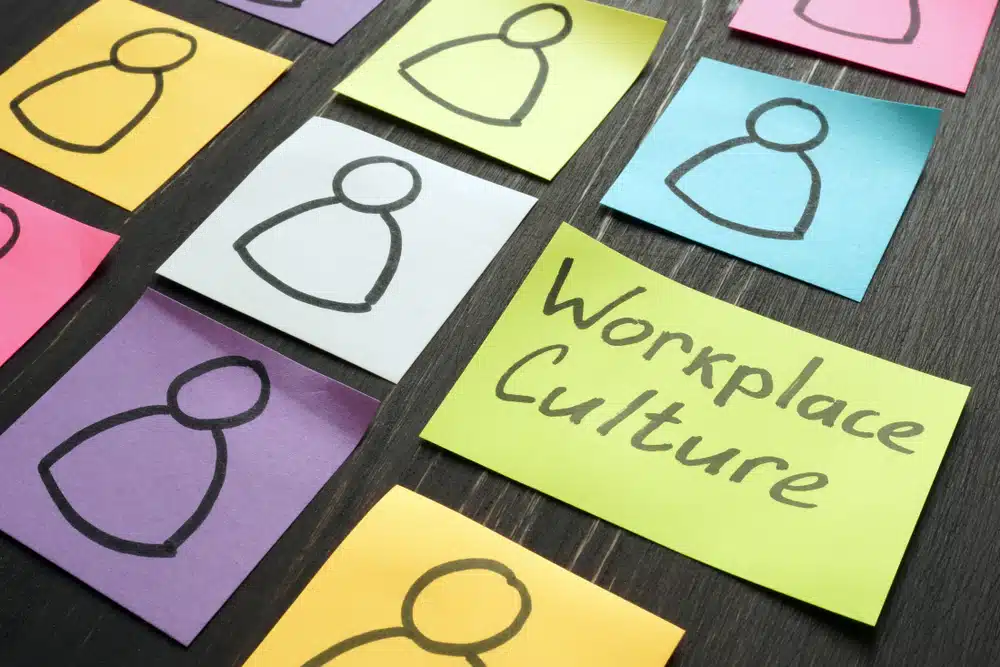
To achieve this, clear communication is fundamental, guaranteeing that every team member is well-acquainted with their roles, duties, and the overarching ethos of the establishment.
Leaders should epitomise exemplary conduct, radiating positivity, being accessible, and championing teamwork. It’s imperative to promote open channels for feedback, wherein employees feel at ease sharing their viewpoints or suggesting improvements, thus fostering a sense of belonging and pride in their contributions.
It’s also crucial to offer consistent training and avenues for continuous learning, equipping employees with opportunities for professional development and mastery of skills.
Lastly, accomplishments, whether they are team-based or individual, should be acknowledged and celebrated. When staff are appreciated and nurtured, they’re far more inclined to offer unparalleled service, enhancing the overall guest experience
What is workplace culture?
Workplace culture refers to the intricate web of values, beliefs, behaviours, and social norms that define the environment within an organisation. It shapes how employees interact with one another, with management, and with external stakeholders.
Rooted deeply in the company’s history, values, and leadership style, workplace culture manifests itself in various tangible and intangible ways, from the formal organisational hierarchy and decision-making processes to the more subtle cues of office decor, dress code, and communication patterns.
A positive workplace culture can boost employee morale, foster collaboration, and drive productivity, while a toxic culture can lead to increased turnover, poor performance, and a tarnished company reputation.
Essentially, it’s the organisational ‘personality’ and atmosphere that either encourages or hinders its members from achieving their full potential
6 tips for good workplace culture
We look at 6 tips for good workplace culture, these include:
1. Respect your employees’ time
A crucial component of a thriving workplace is cultivating an environment where staff look forward to their duties and feel both valued and at ease.
“I’ve been in situations where basic needs, like visiting the restroom, felt like a luxury,” shares Laura, co-proprietor of The Pickle & The Patty. Recognising the individuality and worth of each employee, instead of seeing them as mere cogs in a machine, paves the way for a harmonious atmosphere rooted in mutual regard. Such an environment inevitably makes employees more invested in the organisation’s success, leading them to go the extra mile during their shifts.
Although many in the hospitality sector might argue that managing staff breaks and leave is inherently challenging, Laura Attard and Lyndal Keys, the duo behind The Pickle & The Patty, have a different perspective.
“It really isn’t that complicated. We ensure our team has at least one weekend off. Sure, this might complicate scheduling a bit more, or demand additional attention to detail. However, these are small concessions for ensuring a balanced life for our team,” asserts Laura.
Prioritising regular time off and adequate break periods for every team member conveys a message of appreciation and respect for their efforts.
While the nature of hospitality often entails extended workdays and irregular shifts, acknowledging these demands and rewarding staff appropriately can substantially enhance job satisfaction and loyalty.
2. Be considerate and make life easy for your staff
The world of hospitality is undeniably intense, often rife with high-stress situations. Consequently, the sector experiences significant staff attrition, making it a challenge to attract and retain top talent.
“In the realm of hospitality, it’s an open book that your team needs to be resilient and persistent. It’s demanding, and there’s no way around it,” comments Gareth Naar, the helm of The North Spoon.
Well-aware of the strains inherent to the industry, Gareth is an advocate for enhancing the in-house experience for his team.
“Our approach revolves around valuing our team members. We ensure they’re well-fed and hydrated during their shifts, and they aren’t burdened with any costs on-premises.”
Echoing the sentiments of Laura and Lyndal of The Pickle & The Patty, Gareth stands by the principle of affording his team ample downtime, guaranteeing they’re rejuvenated for their subsequent duties.
“For those working full-time with us, a two-day respite each week is non-negotiable. Long, exhausting shifts aren’t our modus operandi.”
“In the industry, you often hear about daunting 70 to 80-hour weeks. That’s not our narrative. When we embarked on this venture, we committed to steering clear of such exhausting routines, not just for ourselves but for our entire team. We’re earnest in ensuring our team’s welfare and proper rest.”
3. Fight against toxic kitchens and workplace culture
Those seasoned in the hospitality realm will readily recall the traditional, and often harsh, methods that dominated kitchens in the past.
“I recall a chef once told me he’d tear me down just to mould me back in his desired manner,” shares Laura.
Operating in such volatile settings can be immensely draining. Regrettably, there’s a subset within the industry who perpetuate this detrimental ethos to upcoming professionals. The destructive mantra often resonates: ‘I was subjected to it, so I’ll perpetuate it.’
Transforming a deep-rooted work ethos, whether in a venue or an individual, is no small feat. However, pushing for a shift is of paramount importance.
Motivated by their personal ordeals in toxic workplaces, Laura and Lyndal inaugurated The Pickle & The Patty, aiming to redefine the traditional work culture.
“We believed there’s a more humane way to go about it,” reflects Lyndal. “Our discontent with the industry, whether due to clashes with proprietors or the prevalent toxic atmosphere, spurred us to think – why not create a space we’d love?”
Transformative change is seldom instantaneous. But if revitalising your team’s ethos is a genuine goal, it’s essential to ardently advocate for a shift to gradually nurture a healthier work environment.
Initiate this metamorphosis by congregating your team, elucidating your renewed vision for a more uplifting and inclusive work culture. Illustrate both the behaviours that will no longer be tolerated and present alternative, constructive management strategies.
Equally vital is to lead from the front: address any counterproductive attitudes, lauding those whose actions align with your reimagined ethos.
4. Acknowledge and manage stress
While kitchens in the hospitality industry are inherently bustling spaces, it’s a misconception that they need to be perpetually engulfed in tension.
Yes, it’s a given that no work setting can be wholly devoid of stress, but it’s paramount for those in charge to proactively minimise strain, laying the foundation for a congenial work environment.
“When all is said and done, we’re chefs. We need those introspective moments. Is the tension really warranted, or can we perhaps take an extra moment on that dish? It’s a question of perspective,” muses Laura.
For those helming the kitchen, be it as a head chef, manager, or proprietor, delineating the locus of stress becomes pivotal. It’s essential to empower the senior team members to shoulder the challenges that crop up, ensuring that junior staff aren’t overburdened.
Promoting a milieu of candid dialogue ensures that individuals feel secure enough to acknowledge their missteps, viewing them as learning opportunities rather than career jeopardisers.
Laura and Lyndal of The Pickle & The Patty, seasoned with memories of tension-ridden kitchens, were resolute in adopting a divergent approach.
“If I’m spearheading operations and sense escalating anxiety among the crew, we pause. And I reiterate, if there’s a hiccup, the onus is on me. I’m the captain in that scenario, and the weight of any stress should not unduly affect you,” elaborates Laura.
5. Don’t rush recruitment – consider trial shifts
Sourcing the right talent is pivotal in crafting an exemplary workplace ethos. Hence, it’s crucial to be meticulous in the hiring process, ensuring each recruit seamlessly melds with the workplace culture.
“It’s about their experience during the trial. I’m keen to see if they envision themselves here,” notes Gareth.
While CVs offer a glimpse into an individual’s professional journey and interviews delve deeper into alignment with job specifics, a trial shift truly uncovers how a potential hire harmonises with the existing team and overarching culture.
Gareth Naar of The North Spoon extols the merits of a trial shift as a litmus test for gauging a candidate’s compatibility with the restaurant environment.
“For me, when someone is on trial at my restaurant, it’s less about my impression of them. I’m looking to see if they can picture themselves thriving here. It pivots around their sentiments: Do they resonate with the ambience? Do they perceive opportunities for personal growth within our establishment?”
“The essence of a trial is twofold. It’s an avenue for the potential employee to gauge their fit, and it’s also an opportunity for mutual knowledge exchange – for them to absorb from us and impart their expertise in return.”
6. Adapt your leadership style
Many current leaders in the hospitality domain embarked on the conventional journey to chef or management stardom, honing their skills in tension-fraught kitchens, gradually ascending the hierarchy.
Yet, the apprenticeship and nurturing landscape within hospitality has evolved profoundly with time. The methods and environments in which several chefs and managers were nurtured would scarcely find acceptance in today’s establishments.
“Emulating the leadership I experienced isn’t feasible anymore. I’ve had to recalibrate how I guide my team,” muses Michale Rantissi of Kepos Street Kitchen.
It’s imperative for those at the helm to actively reshape their leadership methodologies, ensuring that detrimental management habits don’t erode the venue’s workplace ambiance.
Over the years, Michale has transformed his leadership style, fostering an environment of encouragement and inclusivity, distancing himself from the more severe tutelage methods he once encountered.
“Having objects like pens, pots, or plates hurled at you – these are scenarios you’d scarcely encounter in present times. Back in my days, this wasn’t deemed abuse but was seen as a standard training technique.”
Numerous contemporary hospitality captains were moulded in the old-guard style of the industry, with some perpetuating this noxious culture to emerging talents.
Yet, Michale veers away from this trend. He recognises the shifting sands of time and understands that today’s hospitality professionals come with varied backgrounds and expectations.
“Adapting to today’s interpersonal dynamics is paramount. If you’re striving to inspire a chef reluctant to exceed a 40-hour week, it isn’t indicative of them being pampered. It’s simply their perspective. Rather than judging them, adjustments are needed.”
“Denying their perspectives is counterproductive. Given the plethora of opportunities around, such an approach hardly inspires loyalty or motivation.”
Building a better workplace
A thriving workplace environment is multifaceted and hinges on various factors, including team size, establishment nature, and overarching business objectives.
Cultivating such a culture isn’t an instantaneous task; it demands sustained dedication from the entire team. Especially for management, aligning everyone towards the shared vision of an inclusive workspace is paramount.
Lee Jones is a seasoned Business Finance Specialist with over two decades of invaluable experience in the financial sector. With a keen eye for market trends and a passion for helping businesses thrive, Lee has become a trusted advisor to countless organizations seeking to navigate the complexities of finance.


